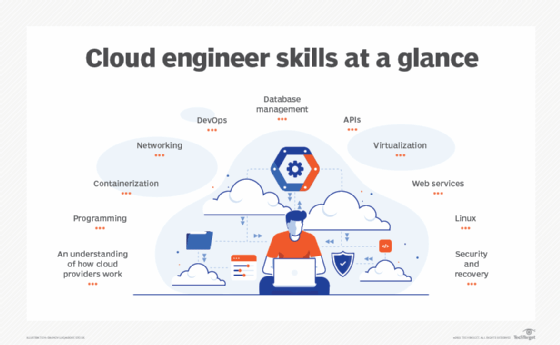cloud engineer
What is a cloud engineer?
A cloud engineer is an IT professional responsible for any technological duties associated with cloud computing, including design, planning, management, maintenance and support.
Cloud engineer is a general term encompassing a few different roles, including:
- cloud architect
- cloud software engineer
- cloud security engineer
- cloud systems engineer
- cloud network engineer
Each position focuses on a specific type of cloud computing, rather than the technology as a whole. Companies that hire cloud engineers are often looking to deploy Cloud services, scale up their use of cloud resources or further their cloud understanding and technology.
Must-have skills for a cloud engineer
Cloud engineers in all roles must have proficiency in the following areas:
- Linux. Cloud engineers should have a strong understanding of the Linux operating system, which companies frequently use for cloud development. Cloud engineers should understand the architecture, maintenance and administration of Linux servers.
- Database skills. Cloud engineers should have cloud database management skills and knowledge of MySQL and Hadoop.
- Programming. Cloud engineers should have strong general programming skills, along with knowledge of programming languages such as SQL, Java, Python, Ruby, Golang, PHP and .NET.
- Networking. Cloud engineers should understand virtual networks and general network management functions.
- DevOps. DevOps is a popular framework for cloud engineering, so having a hands-on understanding of DevOps practices can be valuable to employers. Amazon Web Services (AWS) DevOps in particular is a sought-after skill by cloud providers.
- Containerization. Cloud engineers should have proficiency of containerization tools and understand Docker and Kubernetes.
- Virtualization. Cloud engineers should have the knowledge to deploy and run application software on virtual machines.
- Understanding of cloud providers. As technical cloud features and engineering practices can vary between different service providers, understanding what each offers can enhance a cloud engineer's knowledge and make them more marketable to employers.
- Security and recovery. Cloud security is a growing priority among providers and knowledge of cybersecurity in the context of the cloud is a valuable asset.
- Web services and application programming interfaces (APIs). Cloud engineers should have knowledge of open standards, such as XML (Extensible Markup Language), SOAP (Simple Object Access Protocol), WSDL (Web Services Description Language) and UDDI (Universal Description, Discovery and Integration), and an understanding of how APIs are engineered.

How do you become a cloud engineer?
Competitive candidates for cloud engineer positions generally have the following education, certifications and experience:
Education. A cloud engineer should have at least a Bachelor of Science degree in computer science, engineering or other related field that provides similar skills. Some companies prefer a Master of Science degree.
Certifications. Some companies prefer additional certifications along with education and experience to demonstrate technical knowledge in one or more areas. Popular certifications include:
- vendor-specific certifications for major providers, such as AWS and Microsoft; and
- certifications for skill sets, such as cloud security.
There are many relevant certifications available due to the demand for cloud engineer skills.
For more in-depth information, read how to evaluate cloud certifications.
Experience. Most employers seek cloud engineers with at least three to five years of experience with cloud services -- including Open Source technology, software development, system engineering, scripting languages and multiple cloud provider environments. Additionally, cloud engineers must have a background in building or designing web services in the cloud.
Cloud engineers need experience working with programming languages, including Java, Python and Ruby. Many companies seek cloud engineers who have experience with OpenStack, Linux, AWS, Rackspace, Google Compute Engine, Microsoft Azure and Docker. Experience with APIs, orchestration, automation, DevOps and databases, including NoSQL, are also important.
Types of cloud engineering roles and responsibilities
The title of cloud engineer encompasses a few different cloud-focused engineering roles. As cloud engineering duties require many areas of expertise, each role is specialized:
- Cloud architects manage the infrastructure of the cloud. These positions oversee the architecture, configuration and deployment of applications in the cloud.
- Cloud software developers build and maintain software features and functions, databases and applications for cloud technologies.
- Cloud security engineers build and maintain features to provide security for cloud-based platforms and applications.
- Cloud administrators manage software and hardware associated with the use of cloud-based services.
- Cloud network engineers manage and support network infrastructures and connections between clients and service providers.
- Cloud automation engineers are similar to cloud developers, but this position places an emphasis on automation, orchestration and integration.
For more in-depth information on the different cloud engineering careers, click here.
Cloud engineer salary and career outlook
According to sources, such as ZipRecruiter, Glassdoor, LinkedIn and Salary.com, the average salary for a cloud engineer in the U.S. ranges from $100,000 to $130,000 a year, although these numbers vary based on factors such as skills, education, certifications, if a position is remote and location. According to Northeastern University's website, northeastern.edu, a graduate certificate can boost a person's earnings by an average of 25%.
For more information on cloud technologies and careers, read our definition of cloud computing and our essential guide on starting your cloud career.







